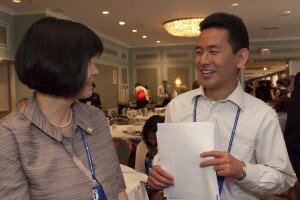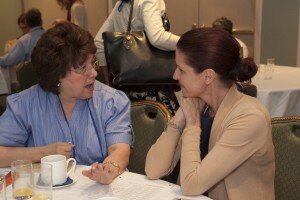 by Veronique Parages, Skills-Based Volunteer Program Director, HandsOn Network
by Veronique Parages, Skills-Based Volunteer Program Director, HandsOn Network
Human Dignity
I was the last person in the Tap-Tap the other day, the crowded little pick up truck used for the local transportation system, on my way back to my volunteer housing.
As usual a mix of kids were coming back from school and people were returning from work.
We all smiled at each other and talked a little.
So many people are living day to day here.
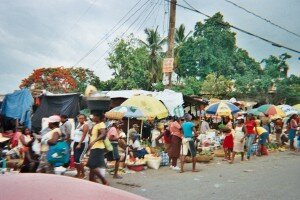 At one point, I shared the tap tap with three women and one of them seemed very poor.
At one point, I shared the tap tap with three women and one of them seemed very poor.
Her skirt was clean but in pieces and her tee shirt might have been nice a long time ago.
She carried a big bucket of water and a plastic bag of fruits that she was probably selling in the market during the day.
She smiled at me, in a shy and sad way.
So far I have not given money to the kids that ask for it from time to time. They don’t insist, but they figure I am worth the try.
Sitting across from the woman in tatters, the children’s requests were on my mind.
Should I give the woman money, I wondered. And if so how much would it take to change her week?
What about the other two women riding the tap tap? They look much better off but I know that life isn’t easy here and everybody is in a kind of permanent survival mode.
What if I offend the woman I want to help?
Orphanage in Port-Au-Prince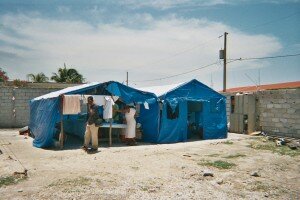
The organization I’m volunteering with is in regular contact with various Haitian orphanages.
Today I visited one of them in PAP.
I walked down a crowded street with a market on each side along high walls.
A sign from a now crumbled hotel hangs over a large, metal door.
Inside, I saw a huge, wild field surrounded by walls.
At the front of the field there were three tents – two plastic and one large, military style fabric tent.
They were all empty.
The lady in charge of the orphanage welcomed me and explained that the orphanage takes care of forty girls aged four to eighteen.
All of the girls go to school and the orphanage staff are proud of that.
There were two showers at the end of the wild garden and an open air rest room.
The fabric tent, as it turned out, was the bedroom for all forty of the girls and the plastic tents were the dining room and the place to work on home work.
There were no beds.
There were three chairs around the long eating table and four low benches for homework.
There were no toys.
Various clothes of all sizes dried in the sun.
A small pile of knock off crocs shoes in all sizes were strewn on the ground.
The orphanages previous building was completely destroyed by the earthquake, along with all of the items that were inside.
I was not expecting so much distress.
The list of items that the orphanage needs is so long!
I have tears on my eyes as I stand there with my meager gift for the girls.
How can I help them?
How much money would it take?
I wonder what organization I can put them in contact with?
I worry about what will happen if the hurricane season blows all tents away.
After I left, I thought of this orphanage all day long and felt terrible.
Later, I received a phone call.
A cousin of a Haitian friend based in Paris that I met during the week-end called for news from my visit.
I shared what I saw there with him.
He used to work in the export of Haitian furniture exporting furniture and is the founder of a foundation created to increase tourism in Haiti.
He knows a lot of people here.
He promises to help me find whatever is needed for the orphanage and I feel a bit relieved and hopeful.
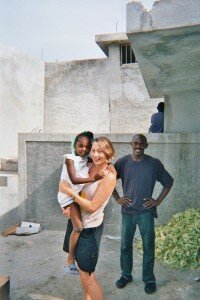 My little friend
My little friend
She is six years old at best and wearing a lovely white dress that is too short for her.
Her hair well organized with cute ribbons and hair ties of different colors.
She comes to the feeding center every day after school because her mum helps out there.
She is shy and didn’t want to talk to me at first.
I am too white, too different I guess.
I kept smiling and talking to her and slowly we learned each other.
Yesterday we had fun reading together and reviewing numbers.
She jumps at me when she sees me now, kisses me and says, “Bonjour!”
Her eyes sparkle with fun.
I hope her Mum will continue to have the money for her to go to school.
She deserves a better life and I want to help her get it.
 Quiet time
Quiet time
After a day spent riding a tap tap for one to two hours and another three hours working in the feeding center, all the volunteers are hot, dusty, sweaty, thirsty, tired and burned by the sun.
My hair is a battle field.
The questions plaguing us all is will we have water and electricity back at home?
Nobody knows why and how, but the electricity and water go on and off without warning.
Some days we have it and some days we don’t.
In our countries we take such things for granted, but here, in Haiti, we suddenly understand the value of it.
Enjoy your comfort today and recognize that half the people on the planet do without!
After taking a cold shower, I sat on the floor of the terrace with a beautiful view on Port-au-Prince and the surrounding mountains.
A cool wind blew.
We, the volunteers and now friends, shared our day, our “special moments” and our questions.
We drank a little bit of wine left by a previous guest, what a treat!!!
We promised each other that we will continue to help Haiti and the Haitians, that we will find the money needed for eight to ten kids from the feeding center to go to school in September.
We promised each other that we will share how incredible the country is for tourism with the very low crime rate and beautiful beaches and landscape.
We promised each other we will continue to support the local nonprofit organizations we met here.

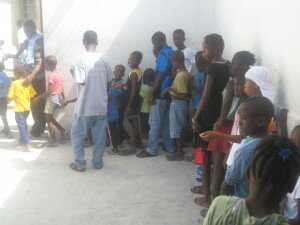 I am so happy I did it.
I am so happy I did it.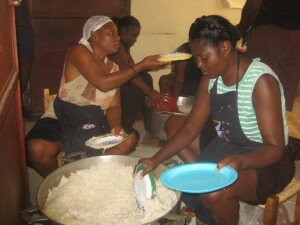
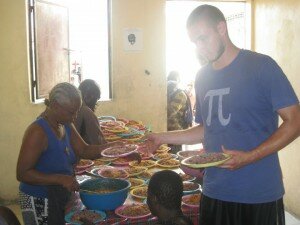 We fill the plates – we give more or less depending on the age – and give it to a person who places it on the table.
We fill the plates – we give more or less depending on the age – and give it to a person who places it on the table.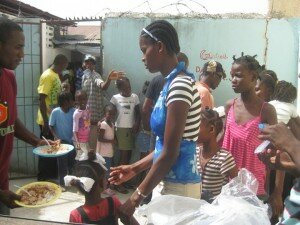 It is always fast and efficient with clear monitoring of who is getting what, with secret codes and rules for people arriving with their own bucket to fill in for families in distress who are not able to come to the window.
It is always fast and efficient with clear monitoring of who is getting what, with secret codes and rules for people arriving with their own bucket to fill in for families in distress who are not able to come to the window.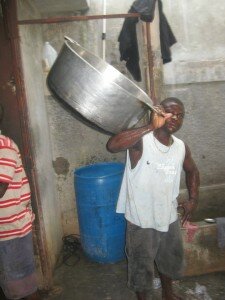 The rice bucket is empty? Let’s bring a new one.
The rice bucket is empty? Let’s bring a new one.
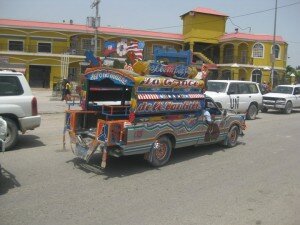 “Tap-tap” is the noise of the passengers’ heads knocking on the roof, the sound of their shoulders and arms hitting the metal borders of the truck bed or their neighbor’s body. It is also the noise of knocking on the roof or the window of the front seats to let the driver know that one of the passengers wants to stop.
“Tap-tap” is the noise of the passengers’ heads knocking on the roof, the sound of their shoulders and arms hitting the metal borders of the truck bed or their neighbor’s body. It is also the noise of knocking on the roof or the window of the front seats to let the driver know that one of the passengers wants to stop.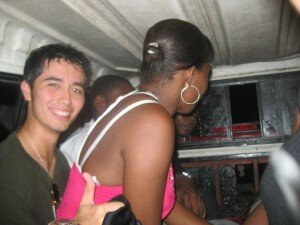 People give you a hand to catch a moving tap-tap still, find places for the pregnant women to sit, hold children on laps, hold a neighbor’s bag, pass on the money and the change, hold you and catch you if you are standing half bent over in between seated people under the low roof losing your balance at each pothole.
People give you a hand to catch a moving tap-tap still, find places for the pregnant women to sit, hold children on laps, hold a neighbor’s bag, pass on the money and the change, hold you and catch you if you are standing half bent over in between seated people under the low roof losing your balance at each pothole.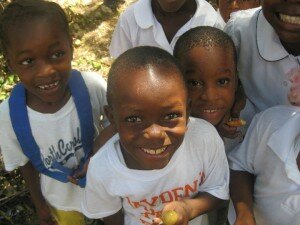 I know it is easy to say and not to do, but talking to the kids, to the students, to the youth in the tap-taps gives me the feeling that if somebody believes in their country and its resources, the Haitians may believe in it again too… How can we help?
I know it is easy to say and not to do, but talking to the kids, to the students, to the youth in the tap-taps gives me the feeling that if somebody believes in their country and its resources, the Haitians may believe in it again too… How can we help?
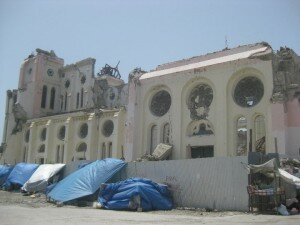 Immediately outside the airport exit, I saw camps and tents full of people.
Immediately outside the airport exit, I saw camps and tents full of people.
 I had heard that
I had heard that 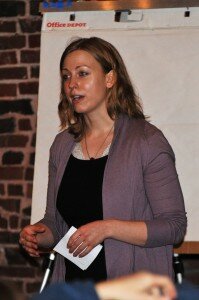
 I’m not sure if it was all the coffee I drank or perhaps the infectious energy of the leaders in the room, but I snapped awake as Neil Bush, Vice-Chair of Points of Light Institute (POLI), shared a compelling statistic: 50% of all service in the USA is driven by Faith-based organizations. No wonder this group of leaders were so eager; they are among a powerful group on the frontlines of solving America’s greatest challenges. And judging by the crowd, they didn’t want to waste a single minute.
I’m not sure if it was all the coffee I drank or perhaps the infectious energy of the leaders in the room, but I snapped awake as Neil Bush, Vice-Chair of Points of Light Institute (POLI), shared a compelling statistic: 50% of all service in the USA is driven by Faith-based organizations. No wonder this group of leaders were so eager; they are among a powerful group on the frontlines of solving America’s greatest challenges. And judging by the crowd, they didn’t want to waste a single minute.
 Eboo Patel sited Obama’s early history as an interfaith leader and activist as a role model of what he envisions could become a social norm. Mr. Patel explained the hidden potential of encouraging interfaith conversations to move from “Niche to Norm” and push the concept of interfaith dialogue into everyday conversations, in much the same way conversations about saving the environment have become normalized in everyday conversations over the past few years.
Eboo Patel sited Obama’s early history as an interfaith leader and activist as a role model of what he envisions could become a social norm. Mr. Patel explained the hidden potential of encouraging interfaith conversations to move from “Niche to Norm” and push the concept of interfaith dialogue into everyday conversations, in much the same way conversations about saving the environment have become normalized in everyday conversations over the past few years.
